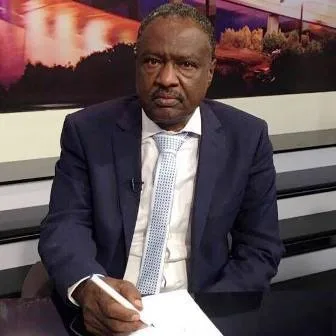A Bullet, a Poem, and a Melody (1–2)

Rashid Abdel Rahim
These days, Sudanese people are celebrating the seventy-first anniversary of the Armed Forces, even as they live through the great victories achieved by the army across all battles.
The Armed Forces’ immense national contribution throughout this venerable history has not been confined to weapons, battles, and war; it has also encompassed wide and diverse fields.
Sudanese hearts were stirred by the sight of singer Atif Al-Samani carrying his weapon and fighting alongside the army in the Battle of Dignity.
Al-Samani was not the only artist to join the Armed Forces; before him, in times of both war and peace, many singers, musicians, poets, writers, and authors stood by their army—sharing their trenches with melodies, music, and verse.
Among the most prominent army officers of great artistic contribution was Major General Awad Ahmed Khalifa, a poet whose songs became deeply rooted in the Sudanese people’s collective memory through the voices of the greatest singers. The legendary Osman Hussein immortalised his lyrics with masterpieces such as Khatirk Al-Ghali (“Your Precious Wish”), Rabee’ Al-Dunia (“Springtime of Life”), and ’Ushrat Al-Ayyam (“The Days We Shared”).
Abdel Karim Al-Kabli also sang his works, including Ya Aghla Min ’Ayni (“Dearer than My Eyes”) and Kayfa Yahoun ’Indak Khisami (“How Could You Take My Dispute Lightly?”).
Zidan Ibrahim enchanted audiences with Khalifa’s gems such as Kunuz Mahabba (“Treasures of Love”) and Fi Bu’dak Ya Ghali (“In Your Absence, My Dear”).
Abdel Aziz Mohamed Daoud gave us Ya Aghla Al-Habayeb (“Dearest of Beloveds”), while Abu Araki Al-Bakhit performed Law Kunta Nakir Lil-Hawa (“If I Denied Love, Like You Did, You Might Have Forgiven Me”).
Another officer of remarkable musical output was Colonel Al-Tahir Ibrahim, who was dismissed from the army for his involvement in two coup attempts against General Ibrahim Abboud. He wrote around twenty songs, many of which were dedicated to the brilliant Ibrahim Awad, forming a celebrated duo that produced enduring works such as Fareeqhu Darbi (“He Left My Path”), Malath Afkarna (“Refuge of Our Thoughts”), A’azz Aziz (“Dearest of the Dear”), Abeit Al-Nas wa Nasiit Khillani (“I Rejected People and Forgot My Friends”), and Law Bu’di Birdeehu (“If My Absence Pleases Him, and My Pain Delights Him, Let Me Endure—it is Time That Will Reveal”).
He also composed for Mohamed Wardi, gifting him with ’Allamt Al-Hubb wal-Reeda (“You Taught Me Love and Affection”) and the patriotic anthem Sha’bak Ya Biladi Aqwa wa Akbar (“My Country’s People are Stronger and Greater than the Enemy Ever Imagined”).
Many officers carried rifles while delighting the nation with song and poetry, including:
Captain Mahmoud Abu Bakr, writer of Sah Ya Kanar (“Be Silent, O Nightingale”),
Lieutenant Abdel Nabi Abdel Qader Marsal,
Lieutenant Yousif Mustafa Al-Tinni, author of the famous patriotic song Fi Al-Fu’ad Tar’ahu Al-’Inaya, wa Bayna Dulu’i Al-Watan Al-’Aziz (“In My Heart Divine Care Preserves, and Within My Ribs Lies My Beloved Homeland”),
Major General Abu Qorun Abdullah Abu Qorun, who wrote About Truth and Legend,
Major General Al-Khair Abdel Jalil Al-Mushrif,
Major General Jaafar Fadl Al-Mawla,
Colonel Siddiq Madathir, who authored the lyrics of Kabli’s masterpiece Daneen Al-Wa’d (“Reluctant Promise”),
Major General Awad Malik, who gave Mustafa Sid Ahmed the lyrical treasure Al-She’r Al-Mu’attar (“Perfumed Verse”).
Nor can we forget the composition of the national anthem, set to music by Colonel Ahmed Mirjan, commander of the military band.
Musical composition flourished under the patronage of the Armed Forces, whose music corps collaborated with many composers who enriched Sudanese song with immortal melodies. These included Bashir Abbas—famed for his works with the Al-Balabil trio, Abdel Latif Khidr, who composed Al-Maseer (“The Fate”) for Ibrahim Awad, Ibn Al-Badia’s Sal Min Sha’rha Al-Dhahab (“Gold Flows from Her Hair”), Hamad Al-Rayeh’s Bayn Al-Yaqza wal-Ahlam (“Between Wakefulness and Dreams”), and numerous works for the Capital Duo. Among them, too, was Brigadier Omar Al-Sha’ir, who composed most of Zidan Ibrahim’s repertoire.
The Armed Forces also served as a wide national platform for writers and historians. Notable among them was Major Hassan Zolfo, who documented the largest Sudanese battles, most famously in his celebrated works Karrari and Sheikan.
Other military authors included Colonel Mahjoub Barir Mohamed Nour, author of the well-known Mawaqif ’Ala Darb Al-Zaman (“Moments Along the Path of Time”), a military study entitled The Tactical Use of Armour, and Nigeria: Between Yesterday and Today. Khalid Al-Kadd wrote The Effendiya and Nationalist Concepts, which he submitted for his PhD in London, and is remembered for his fierce debates with Professor Abdullah Al-Tayeb on free verse and classical poetry.
Many officers also worked in southern Sudan, producing valuable memoirs and novels inspired by their lives there. These include Layali Wau (“Nights of Wau”) by Major General Awad Malik and The Road to Bor by Major Dr Al-Tayeb Ibrahim Mohamed Khair.
While fulfilling its military duty to the highest standard, the Armed Forces never neglected other aspects of life. What we have presented here is only a glimpse—examples that demonstrate its inclusive national spirit, from which it has always drawn inspiration to perform with excellence, no matter how diverse the fields.
A heartfelt salute to our Armed Forces on this blessed anniversary.
Shortlink: https://sudanhorizon.com/?p=7061

